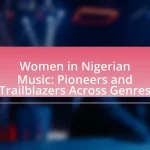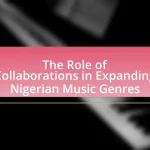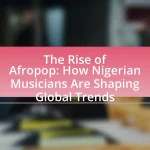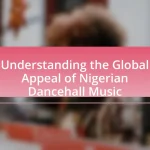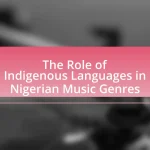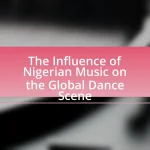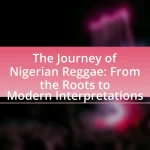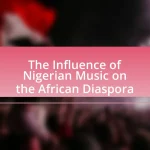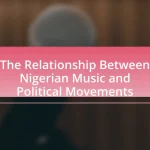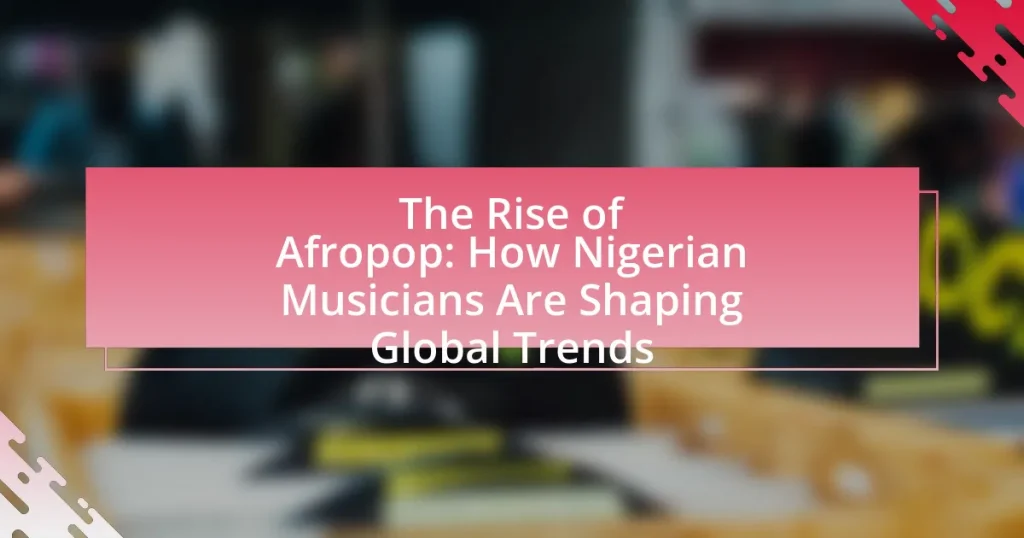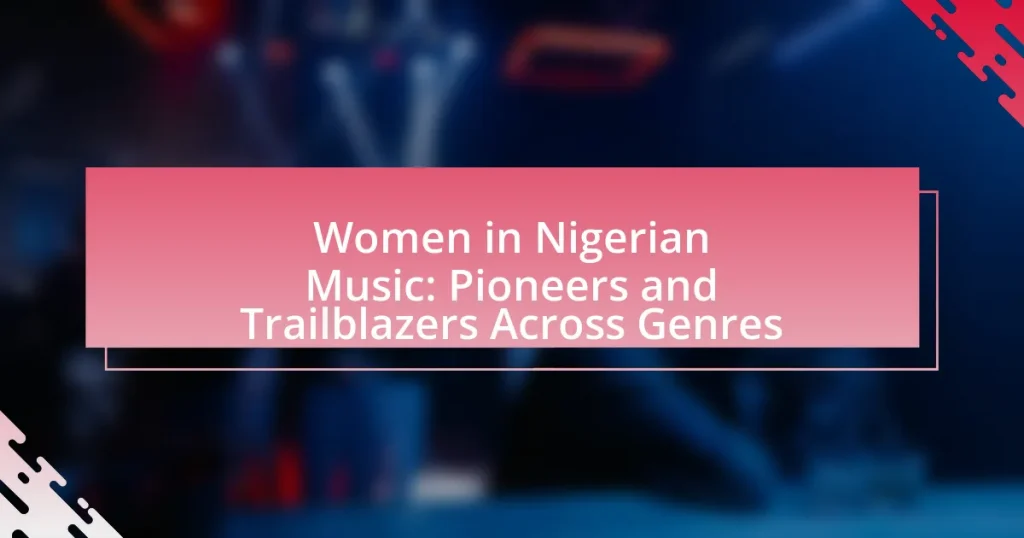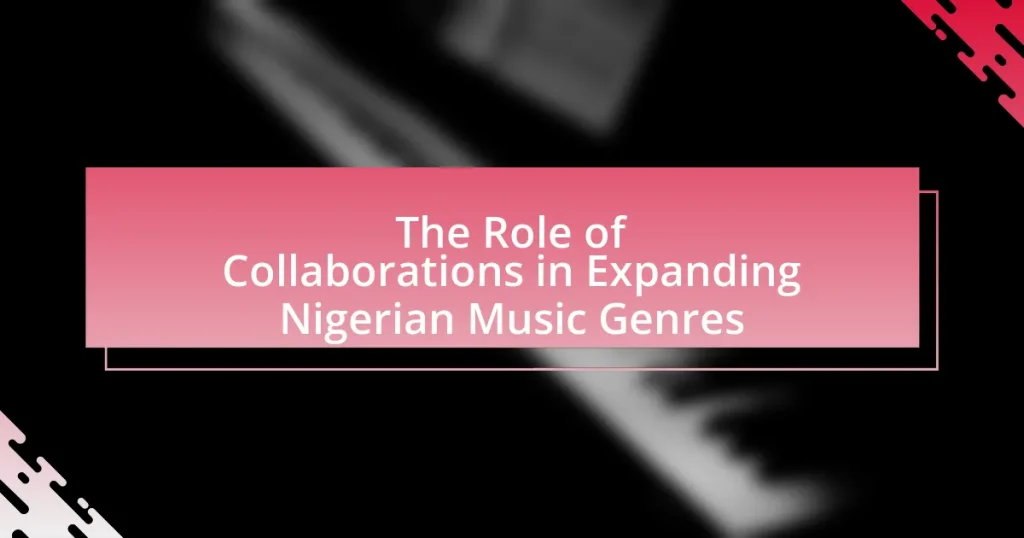Afropop is a genre that merges traditional African music with contemporary styles, primarily emerging from Nigeria. This article explores the significance of Afropop in global music, detailing its origins, cultural influences, and the role of technology in its rise. It highlights the contributions of Nigerian artists like Burna Boy and Wizkid, who have achieved international success and shaped global music trends through collaborations and innovative sounds. Additionally, the article addresses the challenges faced by Nigerian musicians in the global market and outlines strategies for overcoming these obstacles, while also identifying emerging artists to watch in the Afropop scene.
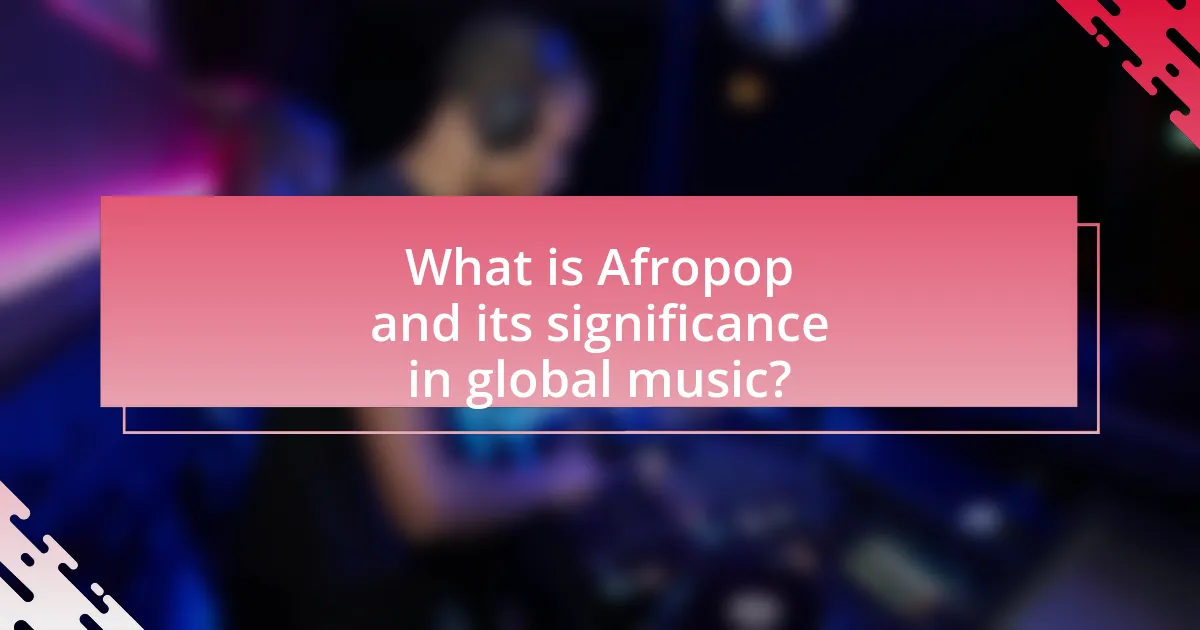
What is Afropop and its significance in global music?
Afropop is a genre of music that blends traditional African rhythms and melodies with contemporary styles, significantly influencing global music trends. Originating primarily from Nigeria, Afropop incorporates elements from various genres such as hip-hop, reggae, and electronic music, making it a dynamic and evolving sound. The genre has gained international recognition, with artists like Burna Boy and Wizkid achieving global chart success, thereby showcasing African culture and artistry on the world stage. This rise in popularity has led to increased collaborations between African musicians and international artists, further solidifying Afropop’s role in shaping the global music landscape.
How did Afropop emerge as a genre?
Afropop emerged as a genre in the late 20th century, primarily in Nigeria, as a fusion of traditional African music with global influences such as jazz, funk, and hip-hop. This genre gained prominence through the works of influential artists like Fela Kuti, who incorporated African rhythms and instruments into contemporary sounds, thereby creating a unique musical identity. The rise of Afropop was further propelled by the proliferation of music technology and media, which allowed for wider distribution and accessibility of African music, leading to its global recognition and influence.
What cultural influences shaped the development of Afropop?
Afropop developed through a blend of traditional African music, Western pop influences, and the impact of globalization. Traditional African rhythms and instruments, such as the talking drum and thumb piano, form the foundation of Afropop, while Western genres like funk, jazz, and hip-hop have infused modern elements into the sound. The rise of technology and media has facilitated the global dissemination of Afropop, allowing artists to reach international audiences and incorporate diverse musical styles. This fusion of local and global influences has led to the evolution of Afropop as a dynamic genre that reflects both African heritage and contemporary trends.
How has technology impacted the rise of Afropop?
Technology has significantly impacted the rise of Afropop by facilitating global distribution and accessibility of music. Digital platforms like Spotify, Apple Music, and YouTube have enabled Nigerian artists to reach international audiences, leading to increased popularity and collaboration opportunities. For instance, the rise of social media has allowed artists to promote their work directly to fans, resulting in viral hits and broader recognition. Additionally, advancements in music production technology have improved the quality of Afropop, making it more competitive on the global stage. According to a report by the International Federation of the Phonographic Industry, digital music revenues in Africa grew by 25% in 2020, highlighting the role of technology in expanding the genre’s reach.
Why is Nigeria a central hub for Afropop?
Nigeria is a central hub for Afropop due to its vibrant music scene, diverse cultural influences, and significant contributions from artists who have gained international recognition. The country’s music industry, particularly in cities like Lagos, fosters creativity and innovation, leading to the emergence of globally popular genres such as Afrobeats. Notable Nigerian artists like Burna Boy, Wizkid, and Davido have achieved worldwide success, with Burna Boy winning a Grammy Award for Best Global Music Album in 2021, showcasing the global appeal of Nigerian music. Additionally, Nigeria’s large population and youth demographic create a robust market for music consumption, further solidifying its status as a leader in the Afropop genre.
What role do Nigerian musicians play in the Afropop scene?
Nigerian musicians are pivotal in the Afropop scene, driving its global popularity and innovation. They blend traditional African sounds with contemporary genres, creating a unique musical style that resonates worldwide. Artists like Burna Boy and Wizkid have achieved international acclaim, with Burna Boy winning a Grammy Award for Best World Music Album in 2021, showcasing the global reach of their music. This fusion of styles not only attracts diverse audiences but also influences music trends across various cultures, solidifying Nigeria’s position as a leader in the Afropop genre.
How does Nigeria’s music industry support Afropop artists?
Nigeria’s music industry supports Afropop artists through a combination of infrastructure, funding, and promotional platforms. The establishment of record labels, such as Mavin Records and Chocolate City, provides artists with resources for production and distribution. Additionally, the Nigerian government has initiated programs to promote the creative industry, including the National Creative Industry Policy, which aims to enhance the economic viability of music. Furthermore, platforms like YouTube and Spotify have enabled Afropop artists to reach global audiences, evidenced by the rise of artists like Burna Boy and Wizkid, who have achieved international recognition and chart success.
What are the key characteristics of Afropop music?
Afropop music is characterized by its fusion of traditional African rhythms with contemporary genres such as hip-hop, R&B, and dancehall. This genre often features vibrant instrumentation, catchy melodies, and rhythmic complexity, reflecting the diverse cultural influences of Nigeria and other African nations. The use of electronic production techniques and the incorporation of local languages and dialects in lyrics further enhance its appeal, making Afropop a dynamic and evolving musical style that resonates with both local and global audiences.
How do instrumentation and rhythm define Afropop?
Instrumentation and rhythm are fundamental elements that define Afropop by creating its distinctive sound and cultural identity. The genre typically incorporates a blend of traditional African instruments, such as the talking drum and shekere, alongside modern electronic elements, which contribute to its unique sonic texture. Rhythm in Afropop is characterized by polyrhythmic patterns that reflect African musical heritage, often featuring syncopation and complex beats that engage listeners and encourage dance. This rhythmic complexity is evident in popular Afropop tracks, where the interplay between various instruments creates a vibrant and dynamic musical experience. The fusion of these elements not only showcases Nigeria’s rich musical traditions but also positions Afropop as a significant player in the global music scene, influencing artists worldwide.
What lyrical themes are prevalent in Afropop songs?
Lyrical themes prevalent in Afropop songs include love, celebration, social issues, and cultural identity. Love is often expressed through romantic narratives and emotional connections, while celebration themes highlight joy, dance, and communal festivities, reflecting the vibrant culture of African societies. Social issues such as poverty, corruption, and political struggles are also addressed, providing commentary on contemporary challenges faced by communities. Additionally, cultural identity is emphasized, showcasing pride in African heritage and traditions. These themes resonate with audiences, contributing to the genre’s global appeal and relevance.

How are Nigerian musicians influencing global music trends?
Nigerian musicians are significantly influencing global music trends through the rise of Afropop, which blends traditional African sounds with contemporary genres like hip-hop, R&B, and dancehall. This genre has gained international recognition, with artists such as Burna Boy, Wizkid, and Davido achieving chart success in markets like the United States and the United Kingdom. For instance, Burna Boy’s album “African Giant” was nominated for a Grammy Award, showcasing the global appeal of Nigerian music. Additionally, collaborations between Nigerian artists and international stars, such as Wizkid’s partnership with Drake on “One Dance,” have further propelled Afropop into mainstream global music, demonstrating its growing influence and popularity.
What collaborations are shaping the global perception of Afropop?
Collaborations between Nigerian artists and international musicians are significantly shaping the global perception of Afropop. Notable partnerships include Burna Boy’s collaboration with American rapper JAY-Z on the remix of “Bigger Than Life,” which introduced Afropop to a wider audience and showcased its cultural richness. Additionally, Wizkid’s collaboration with Drake on “One Dance” not only topped charts worldwide but also highlighted the genre’s mainstream appeal. These collaborations have led to increased visibility and acceptance of Afropop in global music markets, evidenced by the genre’s growing presence in international music festivals and award nominations.
How do international artists incorporate Afropop elements into their music?
International artists incorporate Afropop elements into their music by blending traditional African rhythms, instrumentation, and melodies with contemporary genres like hip-hop, R&B, and electronic music. This fusion often includes the use of Afrobeats’ characteristic beats, such as the four-on-the-floor kick drum pattern, and the incorporation of instruments like the talking drum or the shekere, which are central to African musical heritage. For instance, artists like Drake and Beyoncé have featured Afropop producers and musicians, such as Wizkid and Burna Boy, in their tracks, showcasing the global appeal and influence of Afropop. This collaboration not only enhances the authenticity of the sound but also introduces Afropop to wider audiences, contributing to its rise in global music trends.
What impact do Nigerian artists have on global music festivals?
Nigerian artists significantly influence global music festivals by introducing Afropop and its diverse sounds to international audiences. This genre has gained traction, with artists like Burna Boy and Wizkid headlining major festivals such as Coachella and Glastonbury, showcasing the global appeal of African music. The rise of Afropop has led to increased collaborations between Nigerian musicians and international artists, further blending cultural influences and expanding the reach of African music. Additionally, the popularity of Nigerian artists has contributed to a growing interest in African culture and music, prompting festival organizers to include more African acts, thereby diversifying lineups and enriching the global music scene.
Why is Afropop gaining popularity outside of Africa?
Afropop is gaining popularity outside of Africa due to its infectious rhythms, diverse influences, and the global reach of digital platforms. The genre blends traditional African music with contemporary styles, appealing to a wide audience. Additionally, the rise of Nigerian artists like Burna Boy and Wizkid, who have achieved international chart success and collaborations with global stars, has significantly contributed to this trend. Streaming services and social media have further facilitated the dissemination of Afropop, allowing it to reach listeners worldwide and fostering a growing appreciation for African culture and music.
What role does social media play in promoting Afropop globally?
Social media plays a crucial role in promoting Afropop globally by providing a platform for artists to share their music and connect with international audiences. Through platforms like Instagram, Twitter, and TikTok, Nigerian musicians can showcase their work, engage with fans, and collaborate with other artists worldwide. For instance, the viral success of songs like “Jerusalema” by Master KG, which gained immense popularity through social media challenges, illustrates how these platforms can amplify Afropop’s reach. Additionally, social media allows for real-time feedback and interaction, enabling artists to adapt their styles and marketing strategies based on audience preferences, further enhancing their global presence.
How are streaming platforms affecting the reach of Afropop music?
Streaming platforms are significantly expanding the reach of Afropop music by providing global accessibility to artists and their work. These platforms, such as Spotify and Apple Music, allow Nigerian musicians to distribute their music internationally without the traditional barriers of physical distribution. For instance, in 2020, Spotify reported a 50% increase in Afropop streams, highlighting the genre’s growing popularity outside Africa. Additionally, the algorithms used by these platforms promote Afropop tracks to diverse audiences, further enhancing exposure. This increased visibility has led to collaborations with international artists, thereby solidifying Afropop’s presence in the global music scene.
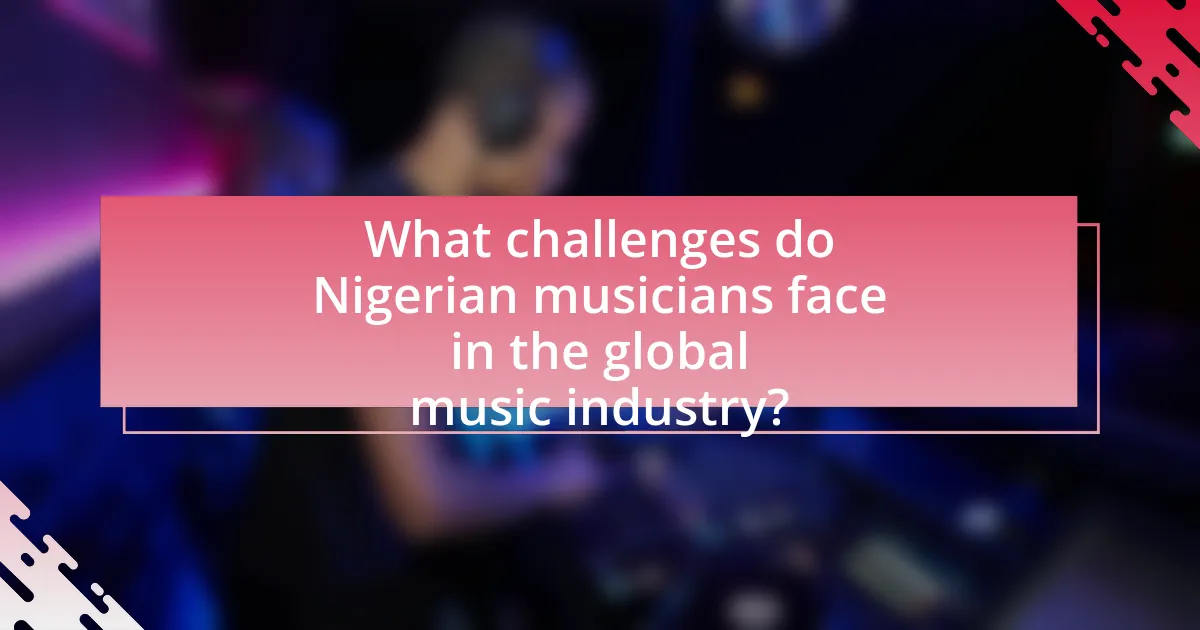
What challenges do Nigerian musicians face in the global music industry?
Nigerian musicians face several challenges in the global music industry, including limited access to international markets, inadequate infrastructure, and issues with copyright enforcement. Limited access to international markets restricts their ability to promote and distribute their music globally, often due to high costs and lack of representation. Inadequate infrastructure, such as poor internet connectivity and insufficient recording facilities, hampers their production quality and outreach. Additionally, issues with copyright enforcement in Nigeria lead to difficulties in protecting their intellectual property, making it challenging for them to monetize their work effectively. These factors collectively hinder the growth and recognition of Nigerian musicians on the global stage.
How do economic factors impact the growth of Afropop artists?
Economic factors significantly impact the growth of Afropop artists by influencing their access to resources, market opportunities, and audience reach. For instance, the rise of digital platforms has enabled artists to distribute their music globally, but economic disparities can limit their ability to invest in production quality and marketing. According to a report by the International Federation of the Phonographic Industry, the global music market grew by 7.4% in 2021, highlighting the potential for Afropop artists to tap into international audiences if they can overcome local economic challenges. Additionally, the economic environment in Nigeria, characterized by fluctuating currency values and limited funding for the arts, directly affects artists’ ability to sustain their careers and innovate.
What barriers exist for Nigerian musicians seeking international recognition?
Nigerian musicians face several barriers in seeking international recognition, including limited access to global distribution channels, inadequate funding for international marketing, and challenges in navigating the complexities of international music rights and royalties. The lack of established networks and partnerships with international labels further hampers their ability to reach wider audiences. Additionally, cultural biases and stereotypes about African music can lead to underrepresentation in global music platforms. According to a report by the International Federation of the Phonographic Industry, African music accounts for only 1.5% of global recorded music revenue, highlighting the economic challenges faced by artists in the region.
How do copyright issues affect the Afropop genre?
Copyright issues significantly impact the Afropop genre by limiting artists’ ability to protect their original works and receive fair compensation. Many Afropop musicians face challenges in enforcing their copyright due to inadequate legal frameworks in Nigeria and other African countries, which can lead to unauthorized use of their music. For instance, a report by the World Intellectual Property Organization highlights that only a small percentage of Nigerian artists register their works, making it difficult to claim rights and royalties. This lack of protection can discourage creativity and innovation within the genre, as artists may fear their work will be exploited without proper credit or payment.
What strategies can Nigerian musicians use to overcome these challenges?
Nigerian musicians can overcome challenges by leveraging digital platforms for distribution and promotion. Utilizing social media and streaming services allows them to reach global audiences without the constraints of traditional music distribution channels. For instance, platforms like Spotify and Apple Music have reported significant increases in African music streams, indicating a growing international interest. Additionally, collaborations with international artists can enhance visibility and credibility, as seen with Nigerian artists like Burna Boy and Wizkid, who have successfully partnered with global stars. Furthermore, investing in quality production and marketing can help create competitive music that resonates with diverse audiences, as evidenced by the rise of Afropop on global charts.
How can collaboration enhance the visibility of Afropop artists?
Collaboration can enhance the visibility of Afropop artists by expanding their audience reach and leveraging the fan bases of their collaborators. When Afropop artists partner with musicians from different genres or regions, they tap into new markets and demographics, increasing their exposure. For instance, collaborations between Nigerian artists and international stars, such as Wizkid’s partnership with Drake on “One Dance,” have significantly boosted their global recognition, leading to chart success and increased streaming numbers. This strategic alliance not only elevates the artists involved but also promotes Afropop as a genre, showcasing its influence on the global music scene.
What role does branding play in the success of Nigerian musicians?
Branding is crucial for the success of Nigerian musicians as it establishes their identity and differentiates them in a competitive market. Effective branding allows musicians to create a recognizable image and narrative that resonates with audiences, fostering a loyal fan base. For instance, artists like Burna Boy and Wizkid have successfully utilized branding strategies that highlight their cultural heritage and personal stories, which have contributed to their international appeal and commercial success. According to a 2021 report by the International Federation of the Phonographic Industry, Nigerian music has seen a significant increase in global streaming, largely attributed to strong branding efforts that connect with diverse audiences.
What are the future trends for Afropop and Nigerian musicians?
Future trends for Afropop and Nigerian musicians include increased global collaborations, genre fusion, and the rise of digital platforms for distribution. Nigerian artists are increasingly partnering with international musicians, as seen in collaborations like Burna Boy with Ed Sheeran, which expands their reach and influence. Additionally, genre fusion is becoming prominent, blending Afropop with hip-hop, R&B, and electronic music, reflecting the evolving tastes of global audiences. The growth of digital platforms, such as Spotify and Apple Music, facilitates easier access to Afropop, allowing Nigerian musicians to reach wider audiences and gain international recognition. This trend is supported by the fact that Afropop has seen a significant increase in streaming numbers, indicating a growing global fanbase.
How might the sound of Afropop evolve in the coming years?
The sound of Afropop is likely to evolve by incorporating more diverse global influences and technological advancements. As Nigerian musicians increasingly collaborate with international artists, genres such as hip-hop, R&B, and electronic music will blend with traditional Afropop elements, creating hybrid sounds. For instance, the rise of platforms like TikTok has already facilitated the global spread of Afropop, allowing for innovative fusions that resonate with younger audiences. Additionally, advancements in music production technology will enable artists to experiment with new sounds and styles, further diversifying the genre. This evolution reflects a broader trend where local music scenes are increasingly influenced by global music trends, as seen in the success of artists like Burna Boy and Wizkid, who have achieved international acclaim while maintaining their cultural roots.
What emerging artists should we watch in the Afropop scene?
Emerging artists to watch in the Afropop scene include Ayra Starr, Omah Lay, and Tems. Ayra Starr gained recognition with her hit “Away,” showcasing her unique blend of Afropop and R&B, while Omah Lay’s “Bad Influence” has made significant waves, highlighting his fresh sound and lyrical depth. Tems, known for her collaboration on Wizkid’s “Essence,” has also been pivotal in bringing Afropop to a global audience, earning her a Grammy nomination. These artists exemplify the innovative spirit of the Afropop genre and are shaping its future on the international stage.
What practical steps can aspiring Afropop artists take to succeed?
Aspiring Afropop artists can succeed by focusing on building a strong online presence, collaborating with established artists, and understanding the music industry. A strong online presence can be achieved through social media platforms, where artists can share their music and engage with fans, as evidenced by the success of artists like Burna Boy and Wizkid, who have leveraged platforms like Instagram and TikTok to reach global audiences. Collaborating with established artists not only enhances credibility but also exposes new artists to wider audiences; for instance, Tems gained international recognition through her collaboration with Drake. Understanding the music industry, including distribution channels and marketing strategies, is crucial, as demonstrated by the rise of Afropop on streaming platforms like Spotify and Apple Music, where strategic releases can significantly impact visibility and success.
